A Qualified Workforce: Mark Priestman interviews Alan O’Neile, Head of Communications at CSCS
Mark Priestman, who writes the regular column about training in Natural Stone Specialist magazine, interviewed Alan O’Neile, Head of Communications at CSCS, to find out what's behind the changes in requirements when applying for CSCS cards and where that leaves the cards.
Does the sound of the CSCS initialism fill you with dread? Or with opportunity? Do you view it as a protection? Or as a bind?
Your answer might depend on whether you already hold a CSCS card, need to qualify for one, specify them for the workforce on your projects, or are responsible for a team of operatives trying to win tenders on just such projects.
Based on the questions I get asked about the card scheme, I made contact with CSCS to request an interview on your behalf with their Head of Communications, Alan O’Neile.
My hope is that this article could form something of a quick guide to CSCS.
At the outset, I just need to state that while Alan has provided useful answers, all users of the CSCS service should check out the full terms and conditions of the services at www.cscs.uk.com.
So, let’s begin...
Mark: What is behind the recent changes to requirements when applying for CSCS cards, Alan?
Alan: Well, Mark, it’s perhaps best if I provide some background first. Over recent years our strategic direction is focused on renewing the connection between CSCS cards and qualifications (usually an NVQ), something that was lost in the early-to mid-2000s in the wake of a particularly punchy speech by John Prescott when he was Deputy Prime Minister.
His speech came off the back of a bad year for the industry in terms of safety, with quite a few deaths. The message the industry heard was effectively: if you don’t sort out your safety record the government will step in and do it for you! The response of the largest contractors was to seek to create a 100% CSCS carded workforce. In the urgency that ensued, cards were not always necessarily issued in relation to a qualification achieved by the holder.
Fast forward to the work of the Construction Leadership Council (CLC) formed in 2013 that has defined with greater clarity the expectations of a skills card scheme. At the beginning of 2015 the CLC announced that industry, including trade associations, contractors, clients and government, should specify and promote card schemes carrying the CSCS logo, with the logo being granted only where the scheme agrees appropriate qualifications for each occupation and where they set a minimum standard for skilled occupations at NVQ Level 2. These requirements went live in January 2015. As a result, we have seen the termination of cards for groups that had no such qualifications, such as Construction Site Operatives, Construction Related Occupations, Industry Accreditation and Visitors. By endorsing this arrangement the CLC is motivating the upskilling of the workforce and aiding confidence that the card holder is qualified for the job they do.
Mark: Some of the contractors who contact me are told it’s the law that their workers must hold a CSCS card. How true is that statement?
Alan: There are no laws that require you to hold a CSCS card. It is a voluntary scheme. It is entirely up to the principal contractor or client whether workers are required to hold a card before they are allowed on site. However, most principal contractors and major house builders require construction workers on their sites to hold a valid card. An example of this is the Build UK Training Standard. Build UK supports the CLC decision and its members have agreed to consistently implement its requirements. Build UK’s membership is made up of clients, main contractors and trade associations representing in excess of 40% of UK construction.
Mark: Thank you Alan, that makes better sense. I know holding an NVQ and the subsequent CSCS card can be a great assistance to an employer or stakeholder as they set about confirming the skills and training credentials of their workforce under the Construction (Design & Management) Regulations (2015). Is there ever cause for one person to hold more than one CSCS card?
Alan: The majority of card holders carry just the one card. However, some construction workers hold a management / supervisory card (black) as well as a skilled worker card (blue or gold). This scenario only happens for 5-10% of card holders – it’s rare.
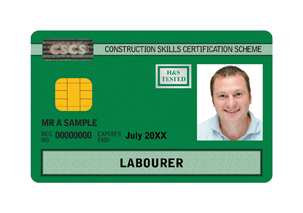 Mark: It is still possible to hold a green Labourer card isn’t it?
Mark: It is still possible to hold a green Labourer card isn’t it?
Alan: Yes, but I would stress that this card is only for those working in labouring occupations. If you do not work in a labouring occupation you will require another card. The best way to find out what card you should be applying for is to use the CSCS Card Finder tool on the CSCS website.
Card Finder will help you to decide which CSCS card to apply for and which CITB Health, Safety & Environment test you need to pass, based on your occupation. Simply enter your occupation into Card Finder and follow the steps on the screen.
For the Labourer card you need to have passed the CITB Health, Safety and Environment test (sometimes known as the touchscreen test) for operatives, within the previous two years. You can apply for this card if you have completed the RQF Level 1 award in Health and Safety in a Construction Environment or SCQF Level 5 REHIS Elementary Health and Safety Certificate (both of which are lifetime qualifications and don’t need re-taking for card renewal). Alternatively, applicants can take a recognised equivalent course. A list of these courses is published on CSCS website. Please note with the equivalents that some are lifetime qualifications and some have expiry dates. It’s worth checking ahead of renewal as these courses can only be used if they are still valid and haven’t expired.
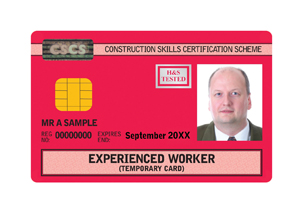 Mark: Then there’s the red CSCS card. What is that for?
Mark: Then there’s the red CSCS card. What is that for?
Alan: We have a number of red cards. A red card shows the employer or site manager that the worker is not qualified, but that they are working towards a qualification. It flags up to the employer that additional supervision might be necessary.
Red cards are non-renewable. This means that on expiry the card cannot be replaced by another red card. The card holder is required to complete the appropriate qualification before the card expires, at which time they should move on to a skilled CSCS card.
Red card holders who do not complete their qualifications by the time their card expires may find they will be unable to apply for another CSCS card. Here are the different ‘flavours’ the red card is issued in:
Trainee cards Available to candidates registered to complete a construction related qualification. The qualification will typically be an NVQ but can also be a CSCS recognised academic or professional qualification. Applicants will first need to pass the CITB Health, Safety and Environment test for operatives within the two years prior to applying for the card.
Apprentice cards This is available to people who have commenced a recognised apprenticeship framework. When applying for this card, you may be exempt from the CITB Health, Safety & Environment test if you have a letter or email from the Managing Agency of your apprenticeship (which must be clearly identified as being from the Managing Agency) confirming that you have met the Managing Agency’s Health and Safety requirements, or a certificate for a one day Health and Safety Awareness course, or a Health and Safety unit is included in your induction or initial qualification. If this is not the case, then you will need to take the CITB Health, Safety & Environment test for operatives before applying for the Apprentice card. This card is valid for four years six months and cannot be renewed.
Experienced Worker This card is available specifically for workers with on the job experience (normally at least one year in the previous three) who are registered to a complete a construction related NVQ or SVQ Level 2 or higher that is acceptable for a CSCS card. Again, applicants must also have passed the appropriate CITB Health, Safety and Environment test (that is, the test appropriate to the NVQ / SVQ they are registered on to) within the previous two years. The card is valid for one year and cannot be renewed.
Experienced Technical, Supervisor or Manager This card is available specifically to supervisors, managers and technical workers with on the job experience (normally at least one year in the previous three) who are registered to complete a construction related NVQ or SVQ Level 3 or higher. Applicants must also have passed the appropriate level CITB Health, Safety and Environment test (the test appropriate to the NVQ / SVQ they are registered on to – for example, a supervisor would take the test identified as ‘Specialist’ and would select the SUP or supervisor option), again within the last two years. The card is valid for three years and cannot be renewed.
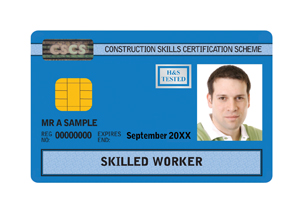 Mark: So now we arrive at the card I would imagine most want to hold, the blue, Skilled Workers card. Who qualifies for this?
Mark: So now we arrive at the card I would imagine most want to hold, the blue, Skilled Workers card. Who qualifies for this?
Alan: You can apply for this card if you have either achieved a construction related NVQ or SVQ level 2 or completed an apprenticeship, such as an Employer-sponsored apprenticeship, a City and Guilds of London Institute Craft Certificate or a CSCS Approved Trailblazer. All applicants must have passed the operative level CITB Health, Safety and Environment test within the previous two years (unless in a specialist occupation). This card is valid for five years.
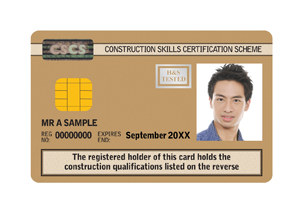 Mark: Everyone loves a gold card. Who does this cater for?
Mark: Everyone loves a gold card. Who does this cater for?
Alan: There are two gold cards. The first is the Advanced Craft card. This card is available if you have either achieved a Construction Related NVQ or SVQ level 3, completed an approved indentured apprenticeship (eg with NJCBI or BATJIC) or completed an employer-sponsored apprenticeship that included the achievement of a City and Guilds of London Institute Advanced Craft Certificate.
All applicants must have passed the CITB Health, Safety & Environment Test within the previous two years. First, though, check on the CSCS website which test to go for. Some people will need to take the Specialists’ test, others the Supervisors’ test, depending on the occupation. This card is valid for five years.
The second card is the Supervisory card. This card is available for supervisor and technical occupations subject to the achievement of a Construction Related Supervisory / Technical NVQ or SVQ level 3 or 4. All applicants must have passed the CITB Health, Safety & Environment Test for Supervisors within two years. This card is valid for five years
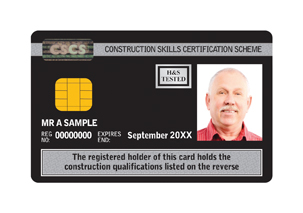 Mark: I meet a lot of operatives who want a black Managers Card. Who qualifies for this one?
Mark: I meet a lot of operatives who want a black Managers Card. Who qualifies for this one?
Alan: This card, which is valid for five years, is available for managers and those in technical occupations subject to achievement of a relevant Construction Management / Technical related NVQ / SVQ level 5, 6 or 7, or holding an NVQ level 4 in construction management and having passed the CITB Health, Safety and Environment Test for Managers and Professionals within two years.
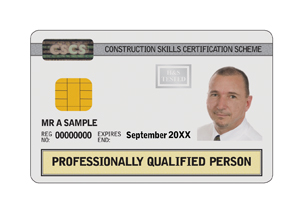 Mark: Then there is the white Professionals Card. Who do CSCS consider appropriate for this card?
Mark: Then there is the white Professionals Card. Who do CSCS consider appropriate for this card?
Alan: The Professionally Qualified Person card is available to competence-assessed members of CSCS-approved professional bodies. You can use the PQP search tool link on the website to find out if your professional body membership covers you for this card. Applicants will need to supply evidence that they are currently a member of the professional body. This card is valid for five years. For renewals, applicants must supply a letter or email from the professional body confirming that they are still a member of the organisation.
Mark: Alan, thank you so much for answering these questions. I believe your clarifications will have greatly assisted our readership.
Mark Priestman is a Partner at Priestman Associates LLP, a leading façade preservation project consultancy. From stonemasonry and heritage skills through to site supervision and conservation management, the partnership is trusted by the leading brands of the sector as an NVQ provider for experienced, upskiller and apprentice workers. Tel: 07876 687212. mark@priestmanweb.com

